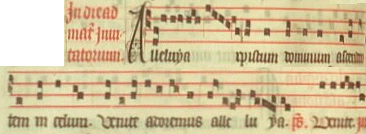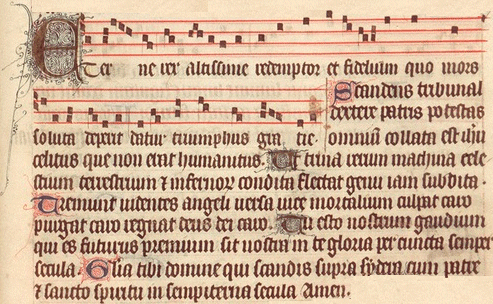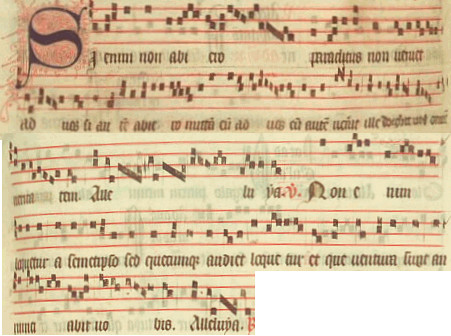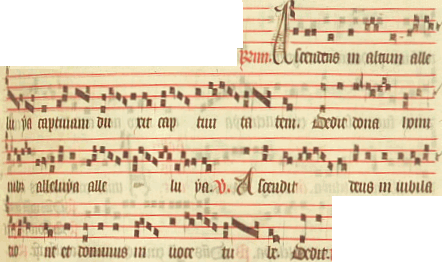Even Years: Cyril of Jerusalem, Catechetical instruction 16, on the Holy Spirit
1,11-12,16 (PG 33, 931-935.939-942)
| τὸ ὕδωρ ὃ δώσω αὐτῷ, γενήσεται
ἐν αὐτῷ πηγὴ ὕδατος
ζῶντος, ἁλλομένου εἰς ζωὴν αἰώνιον. καινότερον
ὕδωρ ζῶν καὶ ἁλλόμενον,
ἁλλόμενον
δ' ἐπὶ τοὺς ἀξίους. Καὶ διὰ τί ἄρα τὴν πνευματικὴν χάριν ὕδωρ ὠνόμασεν;
ἐπειδὴ δι' ὕδατος
ἡ σύστασις
τῶν ἁπάντων. ἐπειδὴ χλοοποιὸν καὶ ζωοποιόν ἐστι τὸ ὕδωρ. ἐπειδὴ ἐξ οὐρανῶν κατέρχεται
τὸ τῶν ὄμβρων
ὕδωρ. ἐπειδὴ μονοειδὲς μὲν κατέρχεται,
πολυειδῶς δὲ ἐνεργεῖ. μία μὲν γὰρ πηγὴ ὅλον παράδεισον
ἐπαρδεύει, εἷς δὲ καὶ ὁ αὐτὸς ὑετὸς κατέρχεται
ἐν παντὶ τῷ κόσμῳ. καὶ γίνεται
λευκὸς μὲν ἐν κρίνῳ, ἐρυθρὸς δ' ἐν ῥόδῳ, πορφυραῖος δ' ἐν ἴοις καὶ ὑακίνθοις,
καὶ διάφορος
καὶ ποικίλος ἐν παντοίοις εἴδεσιν.
καὶ ἐν φοίνικι μὲν ἄλλος, ἐν ἀμπέλῳ δ' ἄλλος, καὶ ἐν πᾶσι τὰ πάντα, μονοειδὴς ὢν καὶ οὐκ ὢν ἄλλος αὐτὸς ἑαυτοῦ. οὐ γὰρ μεταβάλλων ἑαυτὸν ὁ ὑετὸς ἄλλος καὶ ἄλλος κατέρχεται,
ἀλλὰ τῇ τῶν ὑποδεχομένων κατασκευῇ συμπεριφερόμενος
ἑκάστῳ τὸ πρόσφορον
γίνεται.
| The water that I shall give them will become in them a fountain of living water, welling up into eternal life. This is a new kind of water, a living, leaping water, welling up for those who are worthy. But why did Christ call the grace of the Spirit water? Because all things are dependent on water; plants and animals have their origin in water. Water comes down from heaven as rain, and although it is always the same in itself, it produces many different effects. [A single spring can water a whole plantation. The same rain falls everywhere in the world, and becomes white in a lily, red in a rose, purple in the violet and hyacinth; it is different and variagated in many species.] It is one in the palm tree, another in the vine, and so on throughout the whole of creation. It does not come down, now as one thing, now as another, but while remaining essentially the same, it adapts itself to the needs of every creature that receives it.
| | Οὕτω καὶ τὸ πνεῦμα τὸ ἅγιον, ἓν ὂν καὶ μονοειδὲς καὶ ἀδιαίρετον,
ἑκάστῳ διαιρεῖ τὴν χάριν καθὼς βούλεται.
καὶ ὥσπερ τὸ ξηρὸν ξύλον ὕδατι κοινωνῆσαν βλαστοὺς ἐκδίδωσιν,
οὕτω καὶ ἡ ἐν ἁμαρτίαις ψυχὴ διὰ μετανοίας ἁγίου πνεύματος
καταξιωθεῖσα βότρυας
ἐκφέρει δικαιοσύνης. μονοειδὲς δὲ ὂν πολλὰς νεύματι θεοῦ καὶ ἐν ὀνόματι Χριστοῦ τὰς ἀρετὰς ἐνεργεῖ. τινὸς μὲν γὰρ συγκέχρηται
γλώσσῃ πρὸς σοφίαν, ἄλλου φωτίζει τὴν ψυχὴν ἐν προφητείᾳ, ἄλλῳ δὲ δίδωσι δύναμιν
ἀπελάσαι δαίμονας,
ἄλλῳ δὲ δίδωσιν
ἑρμηνεῦσαι τὰς θείας γραφάς. ἄλλου τὴν σωφροσύνην ἐνισχύει, ἄλλον διδάσκει τὰ περὶ ἐλεημοσύνης, ἄλλον διδάσκει νηστεύειν καὶ ἀσκεῖν, ἄλλον διδάσκει καταφρονεῖν τῶν τοῦ σώματος
πραγμάτων, ἄλλον ἑτοιμάζει πρὸς μαρτύριον, ἄλλα ἐν ἄλλοις, αὐτὸ δὲ οὐκ ἄλλο ἑαυτοῦ. καθὼς γέγραπται·
ἑκάστῳ δὲ δίδοται
ἣ φανέρωσις
τοῦ πνεύματος
πρὸς τὸ συμφέρον
| In the same way the Holy Spirit, whose nature is always the same, simple and indivisible, apportions grace to each person as he wills. Like a dry tree which puts forth shoots when watered, the soul bears the fruit of holiness when repentance has made it worthy of receiving the Holy Spirit. Although the Spirit never changes, the effects of his action, by the will of God and in the name of Christ, are both many and marvellous.
The Spirit makes some teachers of divine truth, inspires others to prophesy, gives others the power of casting out devils, enables others to interpret holy Scripture. The Spirit strengthens the self-control of some, shows others how to help the poor, teaches others to fast and lead a life of asceticism, makes others oblivious to the needs of the body, trains others for martyrdom. His action is different in different people, but the Spirit himself is always the same. In each man, Scripture says, the Spirit reveals his presence in a particular way for the common good.
| | πρῶτον μὲν ἥμερος ἡ παρουσία, εὐώδης ἡ ἀντίληψις,
κουφότατον τὸ φορτίον. προαπαστράπτουσιν
ἀκτῖνες φωτὸς καὶ γνώσεως πρὸ τῆς παρουσίας. κηδεμόνος γνησίου σπλάγχνα ἔχον ἔρχεται.
ἔρχεται
γὰρ σῶσαι καὶ ἰάσασθαι,
διδάξαι, νουθετῆσαι, ἐνισχῦσαι, παρακαλέσαι, φωτίσαι τὴν διάνοιαν
πρώτου αὐτοῦ τοῦ δεχομένου, εἶτα δι' αὐτοῦ καὶ τῶν ἄλλων. καὶ ὥσπερ ἐν σκότει πρότερόν τις ὢν εἶτα ἐξαίφνης ἥλιον ἰδὼν φωτίζεται
τοῦ σώματος
τὸ βλέμμα, καὶ βλέπει ἃ μὴ ἔβλεπε
φανερῶς, οὕτω καὶ ὁ τοῦ ἁγίου πνεύματος
καταξιωθεὶς φωτίζεται
τὴν ψυχὴν καὶ ὑπὲρ ἄνθρωπον
βλέπει ἃ μὴ ᾔδει.
| The coming of the Spirit is gentle, his presence fragrant, his weight very light. Rays of light and knowledge stream before him as he approaches. The Spirit comes with the tenderness of a true friend and protector to save, to heal, to teach, to counsel, to strengthen, to console. The Spirit comes to enlighten the mind first of the one who receives him, and then through that person the minds of others as well. As light strikes the eyes of those who come out of darkness into the sunshine and enables them to see clearly things they could not discern before, so does light flood the souls of those counted worthy of receiving the Holy Spirit and enables them to see things beyond the range of human vision of which they had previously been ignorant.
|
Odd Years: Augustine of Hippo, Treatise 6 on 1 John, 9-10 (SC 75, 296-300)
| Hoc est, inquit, mandatum illius, ut credamus nomini filii eius iesu christi et diligamus inuicem.
uidetis quia hoc est mandatum; uidetis quia contra hoc mandatum qui facit peccatum
facit quo caret omnis qui natus est ex deo. sicut dedit nobis mandatum ut
diligamus inuicem. et qui seruauerit mandatum eius. uidetis quia nihil aliud
nobis praecipitur nisi ut diligamus inuicem. et qui seruauerit mandatum eius in ipso manebit et ipse in eo; et in hoc cognoscimus quia manet in nobis, de spiritu quem dedit nobis.
| And this is the commandment of God, that we should believe in the name of his Son Jesus Christ, and that we love one another. You see that this is God's commandment, and you see that anyone who breaks it commits the sin that every child of God avoids. Whoever carries out his commandment —you realize that nothing else is enjoined on us except the love of one another— whoever carries out his commandment abides in God, and God in him. And we can tell that we are dwelling in him by the Spirit he has given us.
| | Nonne manifestum est quia hoc
agit spiritus sanctus in homine ut sit in illo dilectio et caritas? nonne
manifestum est quod ait apostolus paulus: caritas dei diffusa est in cordibus
nostris per spiritum sanctum qui datus est nobis? de caritate enim loquebatur
et dicebat quia in conspectu dei debemus interrogare cor nostrum. quod si non
male senserit cor nostrum: id est si confitetur quia de dilectione fratris fit
quidquid fit in bono opere. accessit etiam quod de mandato cum diceret, hoc
ait: hoc est mandatum eius, ut credamus nomini filii eius iesu christi et
diligamus inuicem. et qui facit mandatum eius in ipso manet et ipse in eo; in
hoc cognoscimus quia manet de nobis, de spiritu quem dedit nobis. si enim
inueneris te habere caritatem, habes spiritum dei ad intellegendum. ualde enim
necessaria res est.
| Is it not clear that it is the work of the Spirit to implant love and charity in human hearts? Is it not clear that, in the words of the Apostle Paul, the love of God has been poured into our hearts by the Holy Spirit who has been given to us? For it was of charity that John was speaking when he said that each of you ought to examine his own heart in the sight of God. If our heart does not reproach us means: if our heart bears witness that love of our brothers is the source of any good work we do. Again we find that when John speaks of God's commandment, he says: His commandment is this, that we believe in the name of his Son Jesus Christ, and that we love one another. Whoever carries out his commandment abides in God and God in him. And we can tell that we are dwelling in him by the Spirit he has given us. If you find charity in yourself, you have the Spirit of God to give you understanding, a thing most necessary.
| | Primis temporibus cadebat super
credentes spiritus sanctus, et loquebantur linguis quas non didicerant quomodo
spiritus dabat eis pronuntiare. signa erant tempori opportuno. oportebat enim
ita significari in omnibus linguis spiritum sanctum quia euangelium dei per
omnes linguas cursurum erat toto orbe terrarum. significatum est illud et
transiit.
| [At the beginning of the Church, the Holy Spirit descended on the believers, and they spoke languages that they had never learned, as the Spirit gave them to speak. These signs suited the times. For it was important for the Holy Spirit to be manifested in every language, since God's gospel was to spread throughout the world in every language. That was demonstrated once and for all by this phenomenon.
| | Numquid modo quibus inponitur manus
ut accipiant spiritum sanctum hoc expectatur ut linguis loquantur? aut quando
inposuimus manum istis infantibus, adtendit unusquisque uestrum utrum linguis
loquerentur? et cum uideret eos linguis non loqui, ita peruerso corde aliquis
uestrum fuit ut diceret: non acceperunt isti spiritum sanctum; nam si
accepissent, linguis loquerentur quemadmodum tunc factum est? si ergo per haec
miracula non fiat modo testimonium praesentiae spiritus sancti, unde fit, unde
cognoscit quisque accepisse se spiritum sanctum?
| Should those on whom hands are laid for them to receive the Holy Spirit speak with tongues? Or, when we lay hands on infants, do each of you expect them to speak wiht tongues? And when he seas them not doing so, some of you, with a perverse heart, would say: They did not receive the Holy Spirit, for if they had received, shouldn't they have spoken in tongues just as on the day of Pentecost.? Therefore, if these miracles do not happen now as a testimony of the presence of the Holy Spirit, how can anyone know whether or not he has received the Holy Spirit?]
| | Interroget cor suum. si diligit
fratrem, manet spiritus dei in illo. uideat, probet se ipsum coram oculis dei.
uideat si est in illo dilectio pacis et unitatis, dilectio ecclesiae toto
terrarum orbe diffusae. non adtendat eum solum diligere fratrem quem adtendit
ante se. multos enim non uidemus fratres nostros et in unitate spiritus illis
copulamur. quid mirum, quia nobis cum non sunt? in uno corpore sumus; unum
caput habemus in caelo ergo si uis nosse quia accepisti spiritum, interroga
cor tuum ne forte sacramentum habes et uirtutem sacramenti non habes. interroga
cor tuum. si est ibi dilectio fratris, securus esto. non potest esse dilectio
sine spiritu dei quia paulus clamat: caritas dei diffusa est in cordibus
nostris per spiritum sanctum qui datus est nobis.
| Let each one question his own heart. If he loves his brothers then the Spirit of God dwells in him. Let him examine and test himself in God's sight, to discover whether he harbours in his heart a love of peace and unity, a love of the Church as it extends throughout the length and breadth of the world. Let him not look for love only of the brother who is present, for we have many whom we do not see, but with whom we are united in the Spirit. There is nothing strange in that. They are not all here with us, but we all belong to the one Body and have a single Head in heaven. So then, if you would know whether you have received the Spirit, ask your own heart: do you perhaps have the outward sign of the sacrament without the virtue of the sacrament? Ask your heart: if the love of your brothers is there, you can be at peace. There can be no love without the Holy Spirit, for Paul cries out to us: The love of God has been poured into our hearts by the Holy Spirit he has given us.
|
| |




